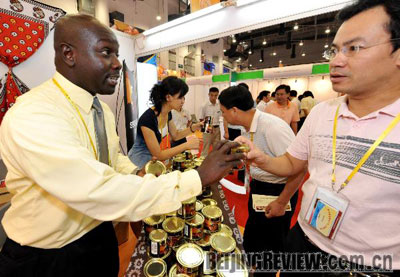|
 |
|
A scene at the Second African Commodities Show in Xiamen, Fujian Province, on September 8, 2008 (Xinhua) |
Chinese President Hu Jintao will pay state visits to Saudi Arabia, Mali, Senegal, Tanzania and Mauritius from February 10 to 17, his second trip to Africa seeking closer cooperation since the 2006 Beijing Summit of the Forum on China-Africa Cooperation (FOCAC).
He Wenping, Director of the Division of African Studies at the Institute of West Asian and African Studies under Chinese Academy of Social Sciences, shares her views on President Hu's visits.
Beijing Review: What will be the highlights of Hu's visits?
He Wenping: I think there will be two major aspects. From the Chinese side, it will boost and consolidate traditional Sino-African friendship. The Beijing Summit and the third ministerial conference of the FOCAC were held in China's capital from November 3-5, 2006. One of the fruitful results was the declaration proclaiming the establishment of "a new type of strategic partnership" between China and Africa. The fourth ministerial conference will be held late this year in Egypt. It will intensify the eight steps that President Hu proposed at the Beijing Summit opening ceremony.
From the African side, it is an opportunity to discuss cooperation between Africa and China to fight against the global financial crisis, as African countries lay a relatively higher expectation on China. Top Chinese officials including Foreign Minister Yang Jiechi and Minister of Commerce Chen Deming paid visits to the continent in recent months, discussing how to maintain or even expand cooperation between China and Africa in business as well as investment by Chinese enterprises in the continent amid the global economic slowdown. High-level visits can help restore confidence.
The world is suffering from the financial crisis; Africa is no exception. What will be the common interests between China and Africa as they jointly resist the crisis?
The biggest challenge that Africa and China face is reduced demand from the export market. It is important for Africa to maintain business ties by expanding trade with Asia, China and India in particular, and vice versa for China. Hence, their common interests are rooted in boosting Sino-African trade where common need is expanding. What's more, it will strengthen Sino-African ties.
Chinese enterprises that focus on natural resource exploration have potential and enough funds. They will make better use of the opportunity to invest in the continent. China is good at infrastructure construction, which happened to be one of the hot topics during the African Union Summit from February 1-3. In my opinion, demand for infrastructure and mechanical and electrical products in Africa will increase. In addition, the economic diversity that Africa stresses is crucial for development. Sudan, for instance, relied too much on oil exports in the past and has to invest more in agriculture since the price of oil has dropped sharply. It is positive for Chinese enterprises to invest in agriculture and manufacturing areas, as the food crisis remains a challenge in Africa.
How do you view the argument that China robs Africa of its resources, regardless of the consequences for the environment, politics and the economy?
It is a biased view. There are more than 800 Chinese enterprises doing business in Africa; and only a few of them, small and private-owned, neglect the environmental impact their activities have on Africa; large and state-owned enterprises are not among them. Otherwise they couldn't survive and maintain sustainable development there.
The Chinese Government is serious about enterprises' social responsibility. President Hu met with heads of African-based Chinese enterprises during his state visit to Namibia in 2006, calling for greater social responsibility. Representatives from more than 60 state-owned enterprises that do business in Africa attended the meeting held by the Ministry of Commerce in 2007, proposing self-discipline and related suggestions.
However, there is a long way to go before all Chinese enterprises become aware of social responsibility. I don't think they intend to neglect the environmental impact their activities have on Africa, for we have the same problems in China; it is sort of an extension of the domestic sphere. By and large, the future for strengthening social responsibility and realizing sustainable development is promising. All they need is time.
|
The Eight Steps Proposed by President Hu Jintao at the Beijing Summit in 2006
1. Double China's 2006 assistance to Africa by 2009.
2. Provide $3 billion in preferential loans and $2 billion in preferential buyer's credits to Africa in the next three years.
3. Set up a China-Africa development fund that will reach US$5 billion to encourage Chinese companies to invest in Africa and provide support to them.
4. Build a conference center for the African Union to support African countries in their efforts to strengthen themselves through unity and support the process of African integration.
5. Cancel debt in the form of all interest-free government loans that matured at the end of 2005 owed by the heavily indebted poor countries and the least developed countries in Africa that have diplomatic relations with China.
6. Further open up China's market to Africa by increasing from 190 to over 440 the number of export items to China receiving zero-tariff treatment from the least developed countries in Africa that have diplomatic ties with China.
7. Establish three to five trade and economic cooperation zones in Africa in the next three years.
8. Over the next three years, train 15,000 African professionals; send 100 senior agricultural experts to Africa; set up 10 special agricultural technology demonstration centers in Africa; build 30 hospitals in Africa and provide 300 million yuan in grants for artemisinin and the construction of 30 malaria prevention and treatment centers; dispatch 300 youth volunteers to Africa; build 100 rural schools in Africa; and increase the number of Chinese Government scholarships to African students from the current 2,000 per year to 4,000 per year.
(Source: Forum on China-Africa Cooperation) |
| 